 Petzlover
Petzlover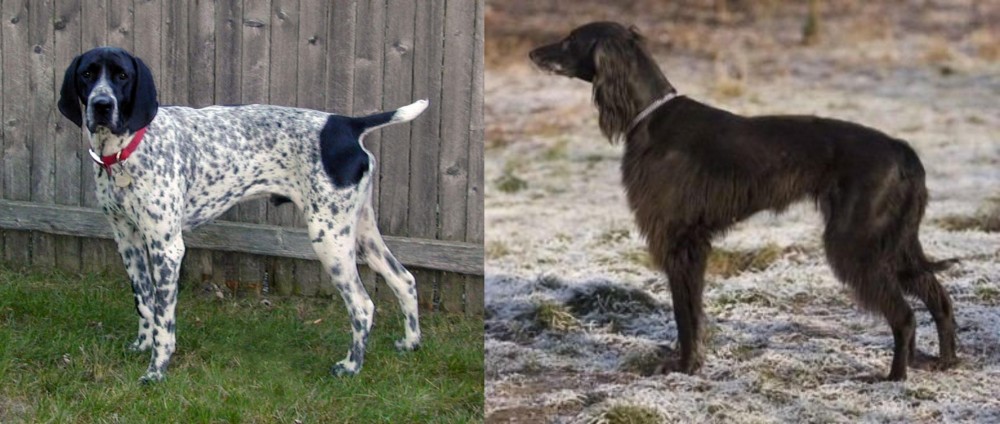 Braque d'Auvergne is originated from France but Taigan is originated from Kyrgyzstan. Braque d'Auvergne may grow 17 cm / 6 inches shorter than Taigan. Braque d'Auvergne may weigh 28 kg / 62 pounds more than Taigan. Both Braque d'Auvergne and Taigan has almost same life span. Both Braque d'Auvergne and Taigan has almost same litter size. Both Braque d'Auvergne and Taigan requires Low Maintenance.
Braque d'Auvergne is originated from France but Taigan is originated from Kyrgyzstan. Braque d'Auvergne may grow 17 cm / 6 inches shorter than Taigan. Braque d'Auvergne may weigh 28 kg / 62 pounds more than Taigan. Both Braque d'Auvergne and Taigan has almost same life span. Both Braque d'Auvergne and Taigan has almost same litter size. Both Braque d'Auvergne and Taigan requires Low Maintenance.
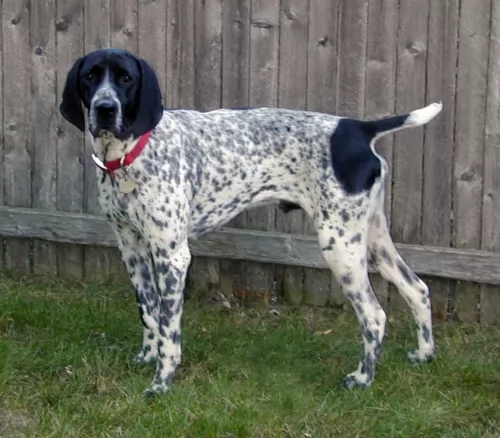 Sometime over 5 centuries ago, in the Cantal Region of France, was born a hunting breed, that might be the real ancestor of today’s pointing hunter dogs. Perhaps the oldest of all pointing gun dog is the Braque d’Auvergne. This breed comes from Central France in the region of Auvergne. This breed was developed prior to written dog breeding records in order to hunt in this region and find, point, flush out and retrieve fowl. This breed is clearly one of if not the oldest breeds in the French Braque. There is no agreement among historians on what breed is the oldest of the European pointing dogs and where they were developed – was it Spain or was it France? It is thought that the Braque Francais Gascogne is the original one of these in the early 1600’s while the Braque d’Auvergne came soon after. Due to the different hunting needs in the different parts of France, the Braque Francais Gascogne was crossed with a lot of other local scent hounds. The Braque d’Auvergne is one of the very oldest of all of these. There are records of the breeds existence in the 1700’s. It is probable that the Braque d’Auvergne was developed by crossing local dogs with Gascogne as well as with the Petit Bleu de Gascogne and the Grand Bleu de Gascogne.
Sometime over 5 centuries ago, in the Cantal Region of France, was born a hunting breed, that might be the real ancestor of today’s pointing hunter dogs. Perhaps the oldest of all pointing gun dog is the Braque d’Auvergne. This breed comes from Central France in the region of Auvergne. This breed was developed prior to written dog breeding records in order to hunt in this region and find, point, flush out and retrieve fowl. This breed is clearly one of if not the oldest breeds in the French Braque. There is no agreement among historians on what breed is the oldest of the European pointing dogs and where they were developed – was it Spain or was it France? It is thought that the Braque Francais Gascogne is the original one of these in the early 1600’s while the Braque d’Auvergne came soon after. Due to the different hunting needs in the different parts of France, the Braque Francais Gascogne was crossed with a lot of other local scent hounds. The Braque d’Auvergne is one of the very oldest of all of these. There are records of the breeds existence in the 1700’s. It is probable that the Braque d’Auvergne was developed by crossing local dogs with Gascogne as well as with the Petit Bleu de Gascogne and the Grand Bleu de Gascogne.
In all of Western Europe, the region of Auvergne is not very populated and has unique geography in that is hilly and has many extinct and eroded volcanoes. A lot of the region is still unpopulated. In this environment, wildlife has flourished, and hunting is successful in providing food for the regions people. This circumstance with an abundance of birds, led to the breeding of the Braque Auvergne to specialize in hunting in this area. The breed is not very popular outside of Auvergne and probably never was. That fact allowed them to be devastated by the Second World War. The Reunion des Amateurs de Braque d’Auvergne (RABA) was started to promote the pure breeding and the protection of the d’Auvergnes. But when Auvergnes was occupied during the war, the slowed breeding of the Braque d ‘ Auvergne almost eliminated the breed. There might have only been about 25 dogs left following the end of the war. These remaining dogs were used to revive the breed, but it is still uncommon, but not rare. Individuals have been imported by other countries including North America. The United Kennel Club (UKC) accepted the breed in 2006 but is not accepted by the AKC (American Kennel Club). The breed is still a working breed and outside of France, very rare.
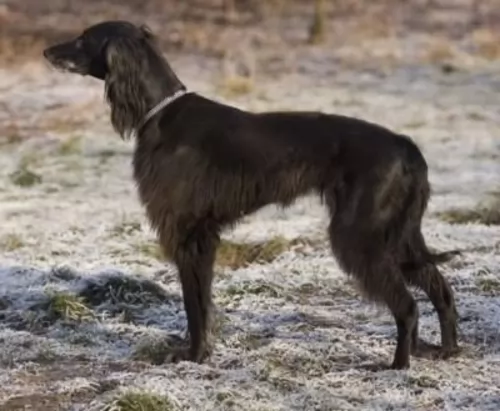 Known also as the Kyrgyzdyn Taighany, the Taigan is a sighthound dog from Kyrgyzstan. Today the dog is recognized by a number of kennel clubs,and more recently by the FCI.
Known also as the Kyrgyzdyn Taighany, the Taigan is a sighthound dog from Kyrgyzstan. Today the dog is recognized by a number of kennel clubs,and more recently by the FCI.
It was after 1991, when Kyrgyzstan became independent, that the role of the dog changed and t became a working dog again.
It was about in 1995 that a new breed standard was adopted, and since 2005 a national kennel club has existed in Kyrgyzstan.
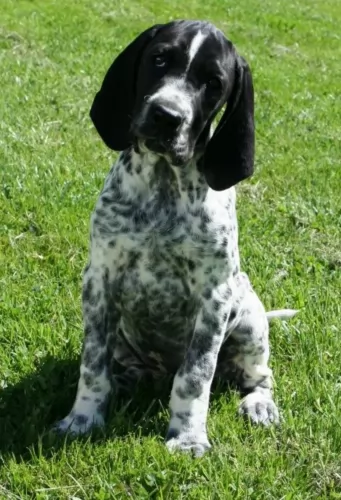 The Braque d’Auvergne is a well built, strong hunting dog with long ears, a large head and a docked tail. His coat is white with black markings and black ears and head. The breed looks a lot like all the other pointing dogs from France. They are medium in stature and has the appearance of a working gundog. He is athletic, muscular and fit. Docking the tail is outlawed in many countries and all of the United Kingdom. In that case the tail is high on the rump and always straight. Their face and head are big for the size of the body and shaped like an oval. With a long muzzle, deep set eyes and a gentle expression, they are kindly and handsome dogs. Their skin is loose but not droopy or wrinkled like hound dogs.
The Braque d’Auvergne is a well built, strong hunting dog with long ears, a large head and a docked tail. His coat is white with black markings and black ears and head. The breed looks a lot like all the other pointing dogs from France. They are medium in stature and has the appearance of a working gundog. He is athletic, muscular and fit. Docking the tail is outlawed in many countries and all of the United Kingdom. In that case the tail is high on the rump and always straight. Their face and head are big for the size of the body and shaped like an oval. With a long muzzle, deep set eyes and a gentle expression, they are kindly and handsome dogs. Their skin is loose but not droopy or wrinkled like hound dogs.
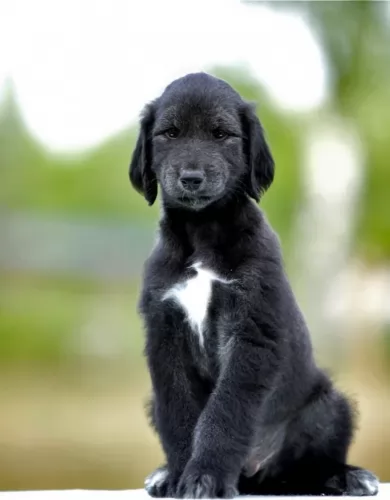 The Taigan is a large dog, looking much like a Grehound. He stands at between 55 and 82cm in height and weighs about 25 - 34kg.
The Taigan is a large dog, looking much like a Grehound. He stands at between 55 and 82cm in height and weighs about 25 - 34kg.
He has that typical slender body and slender head of the greyhound. The coat of the dog is medium length and somewhat curly and can be many colours, sometimes even bi-colored – cream, black and white, brown, grey or yellow.
During the Winter the coat can become long and thick. The ears are floppy and covered with wavy fur. The tail is long and a distinguishing mark of the dog is the way the end of the tail coils up into a ring.
These dogs can’t be kept in small city properties – they are used to wide open spaces.
An intelligent breed, the Taigan will readily learn some basic commands to make him well mannered and obedient. He is strong willed and independent, so it will be beneficial to have him trained.
He also makes a good watchdog. He is an even-tempered dog and he enjoys human companionship although he is somewhat reserved with strangers. Even so, he will still need a strong, firm owner as he is strong-willed and independent and likes to go his own way.
He is able to get along well with children in the home and other pets. Being a fairly large dog, and one that likes to run, he is better suited to large properties in the countryside as opposed to living in the city.
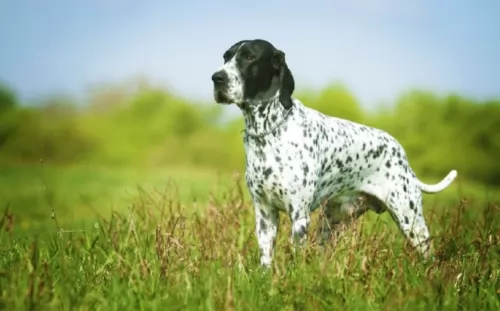 This is a gentle, adaptable and obedient breed. With their intelligence and affectionate nature, they make great family dogs and are eager to please their people. Living with other dogs is fine but not with small, prey size animals. The Braque d’Auvergne should never be left alone pets like gerbils and hamsters. They must be socialized to cats as pets and not prey before living with them successfully. They need to work closely with one human partner. They are first and foremost a hunting dog and need some sort of hunting simulation. They are devoted to their families and want to be constantly in their presence. This can lead to separation anxiety if they are left alone too much. They are great with children and need a family.
This is a gentle, adaptable and obedient breed. With their intelligence and affectionate nature, they make great family dogs and are eager to please their people. Living with other dogs is fine but not with small, prey size animals. The Braque d’Auvergne should never be left alone pets like gerbils and hamsters. They must be socialized to cats as pets and not prey before living with them successfully. They need to work closely with one human partner. They are first and foremost a hunting dog and need some sort of hunting simulation. They are devoted to their families and want to be constantly in their presence. This can lead to separation anxiety if they are left alone too much. They are great with children and need a family.
 The Braque d’Auvergne is a healthy breed but can face some of the same health concerns as other pointers and hunting dogs. The long, droopy ears can get infected easily if wet and need to be cleaned regularly so that food or dirt are not trapped their either. Because of the small gene pool however they may be at risk for several issues. The breeders in France express concerns about possible hip dysplasia and testing is highly recommended. Because they are at risk for other conditions that might not show up until later in life, it is also recommended that they be tested by the Canine Eye Registration Foundation (CERF) as well as the Orthopedic Foundation for Animals (OFA).
The Braque d’Auvergne is a healthy breed but can face some of the same health concerns as other pointers and hunting dogs. The long, droopy ears can get infected easily if wet and need to be cleaned regularly so that food or dirt are not trapped their either. Because of the small gene pool however they may be at risk for several issues. The breeders in France express concerns about possible hip dysplasia and testing is highly recommended. Because they are at risk for other conditions that might not show up until later in life, it is also recommended that they be tested by the Canine Eye Registration Foundation (CERF) as well as the Orthopedic Foundation for Animals (OFA).
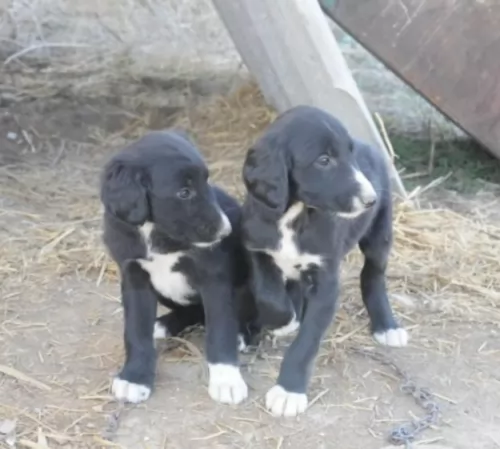 Any dog, no matter how healthy they may appear to be, can encounter any one of the many common dog illnesses there are. It is highly unlikely that your Taigan will experience these health issues but it’s good to be aware of some of them -
Any dog, no matter how healthy they may appear to be, can encounter any one of the many common dog illnesses there are. It is highly unlikely that your Taigan will experience these health issues but it’s good to be aware of some of them -
Also known as osteosarcoma, bone cancer is more commonly seen in large dogs of any breed. It’s a cancer which spreads rapidly through the body and it is terribly sad that the prognosis for your dog is poor.
You might notice swelling, joint pain and lameness and your dog will appear to always be tired. Sometimes you might see a growth. Your vet might do x-rays and if you catch it early, you can give your pet a longer lease on life.
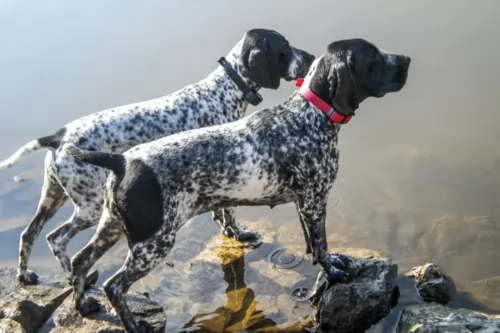 The Braque d’Auvergne needs a high-quality diet fit for a working dog but not too much to make him obese. They are an active breed to choose a formula that is designed for working dogs.
The Braque d’Auvergne needs a high-quality diet fit for a working dog but not too much to make him obese. They are an active breed to choose a formula that is designed for working dogs.
Although no studies have been conducted on the Braque d’Auvergne’s health issues there are many conditions that similar breeds are susceptible to and the d’Auvergne might be as well. This includes any of the following:
This is an active, working dog who needs a lot of stimulation and exercise. The only real appropriate exercise for these dogs is hunting or outings in the woods. He not only needs the exercise, but he also needs to stimulate his sense of smell and his gundog intelligence. He might excel in lure chase or even a form or barn hunt. They certainly could excel at obedience trials and perhaps rally. If you are a weekend hunter then this is the ideal dog for you. They are so easy to train that they surpass other pointers for success with casual hunters. They hunt at a slower pace than many other gundogs. Their intelligence and athleticism lend itself well to agility and flyball also. They need a large (+acres)fenced in area to run and play.
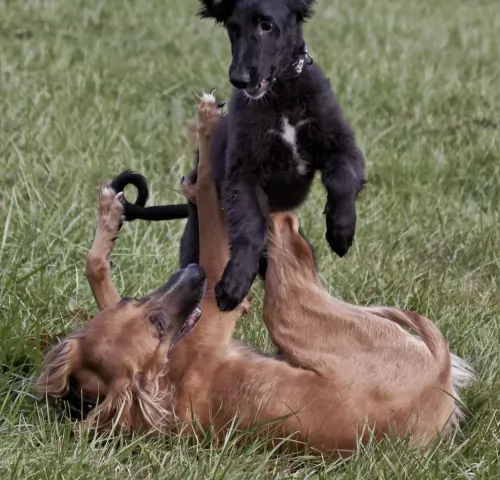 If you feed him one of the commercially manufactured dog foods, make sure its for a large, active dog breed and that it has a good list of ingredients. There are bad packaged dog foods and you want to avoid these. They are devoid of vitamins and minerals.
If you feed him one of the commercially manufactured dog foods, make sure its for a large, active dog breed and that it has a good list of ingredients. There are bad packaged dog foods and you want to avoid these. They are devoid of vitamins and minerals.
Read the packaging to see how much food to give. Also try and give your dog some home-made food too. Make sure it isn’t spicy, exotic foods. Stick to simple, wholesome foods such as boiled chicken, brown rice or pasta, sweet potatoes, spinach and carrots. Chop the food up and mix it into the dry kibble twice a week or so as a treat.